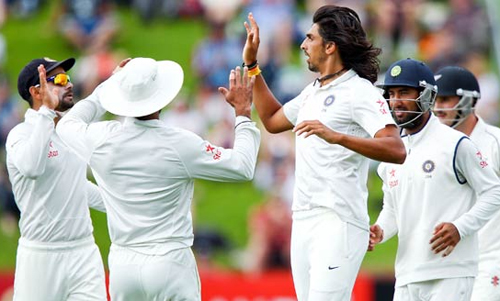
New Delhi, Aug 5: "Want to know what makes him tick," said Australian pacer Kane Richardson will talking about playing alongside Royal Challengers Bangalore (RCB) skipper Virat Kohli in the Indian Premier League (IPL) 2020.
The IPL 2020 will be played in the UAE from September 19-November 10 and the tournament will run for 53 days.
In the players' auction which was conducted in December 2019, RCB managed to bag key players like Richardson, Chris Morris, Aaron Finch, Dale Steyn, Joshua Philippe, and Isuru Udana.
In an interaction with news agency, Richardson talked about playing alongside Kohli and the learning curve which is in store for him by being in the same squad as Proteas great Dale Steyn.
"Huge. These guys (Virat, AB de Villiers) are the absolute legends of the game. Anything I can learn from them will be a bonus, that's for sure.
I am really looking forward to playing with Virat, there are few more competitive players in the world. I am really looking forward to seeing what makes him tick," Richardson said.
The 29-year-old pacer also said that he would want to learn from Steyn as to how to be consistent in all formats of the game over a long period of time.
"There are loads I can learn from Dale. He has been amongst the best at the highest level for so long. His control and ability to swing the ball without losing his pace is really impressive.
I look forward to getting in his ear about how he performs so consistently over a long period, in all forms," said Richardson who has 39 ODI wickets to his credit.
Richardson has so far played 14 games in his IPL career so far and has picked up 18 wickets. The bowler played for Pune Warriors India in 2013, Rajasthan Royals in 2014, and RCB in 2016.
For this year's IPL, RCB has also bagged Australia's limited-overs skipper Aaron Finch, and Richardson thinks having a familiar face in the camp would help him to settle better in the franchise.
"Finchey is an awesome player and a fantastic leader. I am sure it will help to have two Aussies in the side along with Josh who is playing his first tournament after a massive summer in the BBL. We are all professionals, I'm sure it won't take long for us to gel as a side," Richardson said.
However, before the IPL starts, Australia is expected to tour England for a limited-overs series, comprising of three ODIs and as many T20Is.
The side was last seen in action in March this year as they played one ODI against New Zealand in Sydney. After the first match, the remaining two ODIs were postponed due to the coronavirus pandemic.
Talking about the series against England, Kane replied: "We will be fresh, that's one thing, while the England players have been in a bubble for some time now. As long as we get enough practice in before and possibly some centre wicket it should not be an issue."
"They are World Cup holders and the number one ranked side for a very good reason. It will be a tough series also given they will have played a fair bit of cricket together by then. We know we need to work hard on our one-day game which will be a priority over the next period," he added.
The pacer also talked about how the lockdown was like for him, and Richardson feels that everyone would come back strong as a result of this break.
"The break from playing has been refreshing, to be honest. We have come back strong and are well into pre-season training with our states. As a bowler, our loads are not at their peak but we are working towards getting ready for a tour of the UK in a few weeks," Richardson said.
The Australian quick has so far played 25 ODIs and 18 T20Is, managing to take 39 and 19 wickets respectively.







Comments
Add new comment